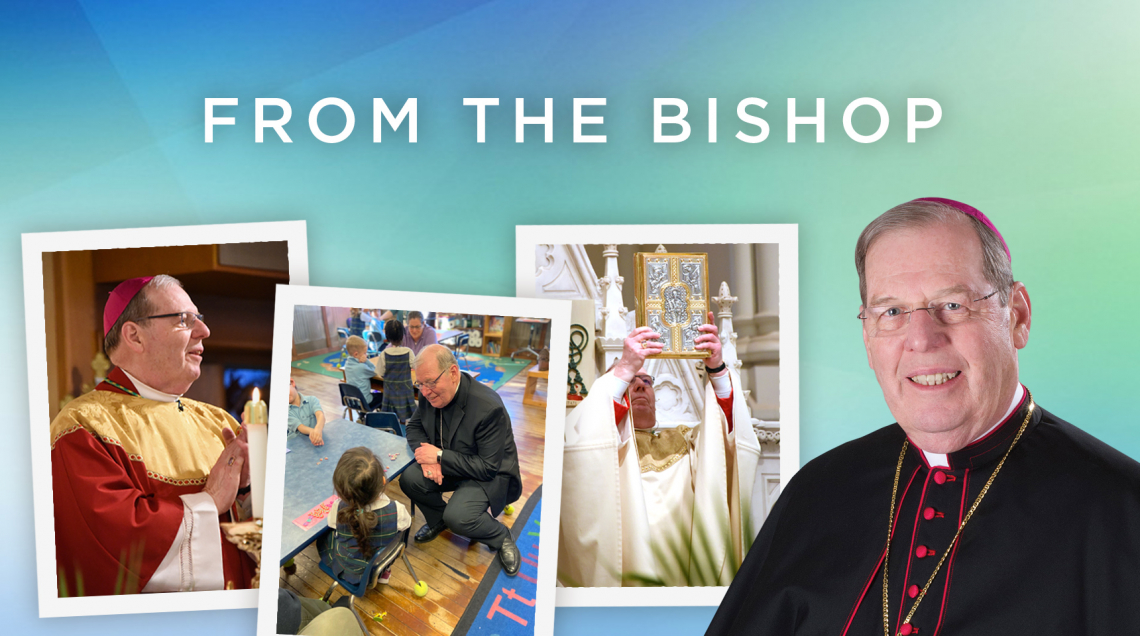Walking together as a synodal Church

Pope Francis has expressed a strong interest and advocacy for a synodal process of discernment, prayerful listening, and sharing of ideas for the future of the Church. The notion of synod as a journey or “walking together” is an image of the Church that is a foundation for Pope Francis’ teaching. In his first words to the Church after his election, on the balcony at the front of St. Peter’s Basilica, he said, “And now, let us begin this journey: bishop and people. This journey of the Church of Rome, which is the one that presides in charity over all the Churches, a journey of brotherhood, of love, of trust among us.” In this one sentence, he used the word “journey” three times. The Greek word “synodos” carries the meaning of walking together. Journey and walking together are two descriptions of the process that Pope Francis has encouraged. We are to become a synodal Church, one in which each of us listens to each other as we discern our way forward as Church under the guidance of the Holy Spirit.
Convinced that synodality is a constitutive dimension of the Church, Francis announced a Synod on Synodality on March 7, 2020. Entitled “For a Synodal Church: Communion, Participation and Mission,” its name announced its purpose. The first session of the synod happened in the fall of 2023 after an extensive consultation process had been undertaken in the worldwide Church. Even before the 2023 session began, it was decided that a second session would be held in the fall of 2024. By its very nature, a synod such as this will continue to expand itself. Already, Pope Francis has established some committees that will continue to study issues raised at the first session of the synod after the conclusion of the 2024 session.
With this column, I want to communicate with you some considerations raised in the consultation process we did in the Diocese of Portland in preparation for the 2024 session of the synod. We were asked to convoke meetings of the faithful in different parts of the diocese. The question for discussion was this: “A synodal Church, in announcing the Gospel, ‘journeys together.’ How is this ‘journeying together happening today in your local Church? What steps does the Spirit invite us to take to grow in ‘journeying together’?” We convened three public meetings in which I participated with Msgr. Marc Caron, our vicar general and moderator of the curia, along with David Bearse, a member of our diocesan tribunal and of the staff for the synod consultations. We were also helped by Molly DiLorenzo and the diocesan communications office.
The meetings were held in Caribou, Waterville, and Scarborough on Saturday mornings during Lent. The participants were engaged and from many different backgrounds. In total, we probably gathered a little over 150 people. It is important to note that these discussions were grounded in prayer, asking for the guidance of the Holy Spirit. When we speak of evangelization it seems important that we be consciously faithful to the Gospel of Christ in the discernment we do.
Some of the successes of the diocese cited by the participants were the availability of eucharistic adoration in many parishes and the varied works of Catholic Charities Maine. These works are a powerful witness of outreach to the peripheries of the Church. Small-group faith sharing in many parishes was an enriching source of strength for many as is the ministry at the Newman Center in Orono. In parishes, retreats and opportunities offered for prayer were seen as positive ways to evangelize and re-evangelize those who may have fallen away from regular practice of the faith.
Among the distresses experienced in the diocese was the low number of seminarians. It is important that we continue to encourage vocations to priesthood and religious life. More candidates for priesthood would strengthen our ability to continue to make the sacraments available throughout the diocese. It was also noted in some discussions that women, though doing the bulk of the work of the Church, are thought to be underrepresented in making decisions in the diocese inasmuch as they are not admitted into ordained ministry. Pastorally, dealing with the gap between the Church’s teaching on sexual matters and changing societal norms was also seen as a challenge and a point of stress. It was also pointed out that, although Catholic Charities Maine serves admirably as the charitable arm of the Church, parishes themselves could do more in promoting discussion concerning international peace and justice.
When asked for suggestions regarding concrete structures that would help all the baptized to respond to the call of Christ to live as Christians, the suggestion was made that parishes need not only to have a pastoral council on paper, but those councils should meet and engage parishioners. A question was also raised about the age of receiving the sacrament of confirmation in the diocese, as well as the present arrangement of clusters in the diocese given demographic changes that have occurred in the last 20 years.
The discussion was rich and prayerful as well as respectful. I am grateful to those who participated in these sessions. They were enthusiastic in their support for further conversations like this.
We are now amid the joy of Easter. We live in the hope that the Risen Christ gives us. May you know that hope and the joy it brings. Share it with others!
God bless,
Bishop Robert Deeley, JCD










